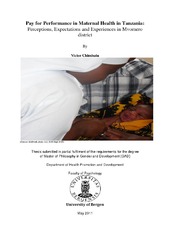Pay for Performance in Maternal Health in Tanzania: Perceptions, Expectations and Experiences in Mvomero district
Master thesis
Permanent lenke
https://hdl.handle.net/1956/5311Utgivelsesdato
2011-05-30Metadata
Vis full innførselSamlinger
Sammendrag
In 2008, Tanzania was one of the 11 countries responsible for 65% of all maternal deaths in the world. The Ministry of Health and Social Welfare of Tanzania in 2008 acknowledged lack of commendable progress in reducing maternal deaths. At the heart of the lack of progress are challenges in human resources for health, including poor motivation among health workers. In 2009, the Government of Tanzania decided to introduce P4P in mother, newborn and child health (MNCH), in order to bring down the MMR and accelerate progress towards Millennium Development Goals 5&4 addressing mother and child health. Pay for performance links incentives with performance and assumes that better health worker performance improves acceptability, utilisation and quality of health services. The study explores how service provision and the use of incentives in maternal health is perceived by health practitioners and community members The study was carried out in Mvomero district in Tanzania, at 5 health facilities. The study's approach was qualitative. Twelve in-depth interviews were conducted with health workers and 3 focus group discussions were also conducted with community members. A number of perceived barriers to the access of health services were reported. The barriers existed on both the provider and the user side. By and large, provider side factors seemed to play a major role in the low-utilisation of health services and of these, supply shortages were the mostly cited impediment to the provision of health services. Health workers reported dissatisfaction and demotivation with the current working conditions citing mainly the perceived unfair remuneration system and supply shortages as major factors. Mixed views to the use of incentives in health care were reported. There were some concerns that P4P might undermine the quality of health services by promoting unethical behaviours such cheating, emphasis on quantity against quality or prioritisation of rewarded services. On the other hand P4P was perceived to have the potential of increasing health worker motivation, cooperation and teamwork at facility level. The study concluded that in view of health workers and community members' perceptions and experiences related to incentives and service provision, steps should be taken to ensure that the conditions for successful implementation should be in place before the P4P programme is scaled up. This involves ensuring the availability of basic equipments, staff and routines at facility level.
Utgiver
The University of BergenOpphavsrett
Copyright the author. All rights reservedThe author
